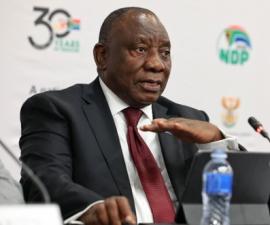
As South Africa grapples with the effects of global geopolitical developments, President Cyril Ramaphosa says the country can only overcome these challenges through a united effort.
Delivering the opening remarks at the meeting between the National Executive and the Eastern Cape Provincial Executive Council, the President emphasised the importance of collaboration in the face of mounting external pressures.
“We would like today to be a productive engagement in sustainable solutions that will uplift our communities and, in the end, improve the lives of our people. Yes, as we deal with the impact of what is happening at the geopolitical level, with tariffs that are imposed on us which will have an impact on a number of companies that operate here in Eastern Cape as well as nationally.
“Those are the challenges that we need to deal with and address, and it is only with collective effort that we will be able to succeed, and by working together we can confront and indeed overcome the challenges that are holding us back,” the President said.
The President and his National Executive met with Eastern Cape Premier Oscar Mabuyane and his executive council at the Nelson Mandela Bay Stadium to discuss conditions and opportunities in the province.
The meeting formed part of strengthening intergovernmental cooperation, collaboration and consultation. President Ramaphosa said engagements such as these were critical for South Africa to realise its full potential.
“We will continue addressing the challenges we face. It is only when we have these types of engagement and put our thoughts together that we will be able to achieve our true potential,” he said.
President Ramaphosa reaffirmed his government’s commitment to strengthening intergovernmental relations. The President said the engagement marked the fifth formal meeting between the national and provincial executives since November last year, following similar sessions in Limpopo, Mpumalanga, KwaZulu-Natal, and Gauteng.
“We hope to conclude our first round of visits to all the provinces in the next few months. This is part of our commitment as the Government of National Unity to engage with provinces on a more regular and structured basis. The purpose of these engagements is to open a new frontier for inter-governmental cooperation,” he said.
He said the engagements are meant to complement existing structures like the President’s Coordinating Council and foster a more integrated and effective governance model, in line with the District Development Model (DDM).
The DDM, he explained, seeks to break down silos in government and enable smarter, more efficient delivery of services across all spheres of government.
During the meeting, the President acknowledged the strategic alignment between the Eastern Cape’s Provincial Development Plan and the national priorities of the seventh administration, which include inclusive economic growth, job creation, reducing poverty and the cost of living, and building a capable, ethical, and developmental state.
“We are pleased that the Eastern Cape Provincial Government has aligned its Provincial Development Plan with these priorities. In your State of the Province Address in February, you identified a number of ‘growth frontiers’ that will be the focus for the Eastern Cape for the coming financial year.
“We look forward to the upcoming presentation, which will outline these priorities in greater detail and provide a roadmap for implementation,” he said.
However, the President painted a sobering picture of the challenges facing the province.
These include high levels of poverty, inequality and unemployment, a significant infrastructure backlog, and poor service delivery in key sectors such as health and education.
He expressed concern over the findings of the Auditor-General’s 2023/24 Consolidated General Report, which showed that although there had been progress in clean audits, increasing from five to nine departments, the Eastern Cape had the highest number of material irregularities among all provinces, amounting to an estimated R197 million in financial losses.
“Despite progress in many areas, the province’s growth and development is also significantly hampered by poor governance, mismanagement of public resources, and corruption – particularly at a municipal level,” President Ramaphosa said.
He cited specific failures in the education and health departments, where performance indicators were not met, warning that financial management must be coupled with improved service delivery outcomes.
“We must be concerned when we see the collapse of services and the deterioration of infrastructure in our metros, cities and towns.
“We must be concerned at the sight of pensioners being forced to cross raging rivers in drums because there are no bridges, or sick patients lying on the floors of hospitals because there are no beds,” the President said.
The President added that the extent of these and other challenges meant that there was a need to make critical decisions about resource allocation and spending in a difficult economic climate.
“We are called upon to drive inclusive growth and job creation within an ever more volatile global economy. We are called upon to answer the cries of our people for better service delivery, for jobs, for decent healthcare and education, and for protection from crime and gender-based violence,” he said.
The President urged both national and provincial leaders to work together to ensure that the province’s natural wealth and potential are translated into meaningful development for its people. – SAnews.gov.za


